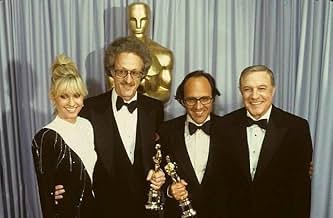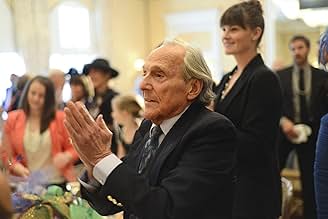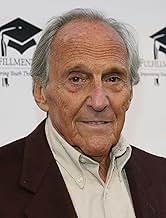Norman Gimbel(1927-2018)
- Soundtrack
- Music Department
- Composer
Norman Gimbel was a native New Yorker who put his teaching degree from Columbia University into his safe and went downtown to pursue a career in songwriting instead. His first job in the music world was as an office boy for a music publisher in the famed Brill Building. There he met composer Larry Coleman and lyricist Joe Darion and with them wrote his first hit, "Ricochet Romance." Shortly after that, with composer-pianist Eddie Heywood, he wrote "Canadian Sunset."
His work caught the attention of Frank Loesser, who signed Gimbel as a contract writer. Under Loesser's guidance, he met composer Moose Charlap, with whom he wrote two Broadway musicals, Whoop-Up and The Conquering Hero.
In 1963, publisher Lou Levy introduced Gimbel to a young composer named Antonio Carlos Jobim. Gimbel would go on to write English versions of many of Jobim's songs, most notably the lyrics for "Meditation," "How Insensitive," "Agua de Beber (Water to Drink)," "Song of the Sabia," and "The Girl From Ipanema." Gimbel also wrote English lyrics for "Watch What Happens," and the Academy Award-nominated song "I Will Wait for You," both by Michel Legrand. For Jean "Toots" Thielemans he wrote the lyrics for his jazz waltz, "Bluesette."
In the spring of 1968, Gimbel moved to Hollywood where he became active in film and television. Among the composers he worked with there were Lalo Schifrin, Maurice Jarre, Quincy Jones, Jack Elliot, Bill Conti, Michel Colombier, Henry Mancini, Peter Matz, Pat Williams, Robert Folk, David Shire, Fred Karlin, and his daughter, Nelly Gimbel. His principal collaborator was Charles Fox.
Gimbel had some of his biggest successes with Fox, with whom he wrote TV title songs to "Happy Days," "Laverne and Shirley," "Wonder Woman," "Angie," and "The Paper Chase." Their collaboration also included "I Got A Name" for the 1973 film The Last American Hero. This became a Top 10 hit for Jim Croce. Fox and Gimbel also gave us "Killing Me Softly With His Song," which won the Grammy Award for Song of the Year in 1973 and was ranked No. 11 on BMI's 1999 list of "Top 100 Songs of the Century." Also with Fox he wrote "Richard's Window" for the film The Jill Kinmont story. This received an Academy Award Nomination in 1975. They received another Academy Award nomination in 1978 for "Ready to Take a Chance Again," from the film Foul Play. In collaboration with composer David Shire, for the 1979 film Norma Rae, he wrote "It Goes Like It Goes," the song that won Gimbel an Academy Award for Best Original Song.
Norman Gimbel's songs have appeared in over four hundred motion picture and television shows. Gimbel was inducted into the Songwriters Hall of Fame in 1984.
His work caught the attention of Frank Loesser, who signed Gimbel as a contract writer. Under Loesser's guidance, he met composer Moose Charlap, with whom he wrote two Broadway musicals, Whoop-Up and The Conquering Hero.
In 1963, publisher Lou Levy introduced Gimbel to a young composer named Antonio Carlos Jobim. Gimbel would go on to write English versions of many of Jobim's songs, most notably the lyrics for "Meditation," "How Insensitive," "Agua de Beber (Water to Drink)," "Song of the Sabia," and "The Girl From Ipanema." Gimbel also wrote English lyrics for "Watch What Happens," and the Academy Award-nominated song "I Will Wait for You," both by Michel Legrand. For Jean "Toots" Thielemans he wrote the lyrics for his jazz waltz, "Bluesette."
In the spring of 1968, Gimbel moved to Hollywood where he became active in film and television. Among the composers he worked with there were Lalo Schifrin, Maurice Jarre, Quincy Jones, Jack Elliot, Bill Conti, Michel Colombier, Henry Mancini, Peter Matz, Pat Williams, Robert Folk, David Shire, Fred Karlin, and his daughter, Nelly Gimbel. His principal collaborator was Charles Fox.
Gimbel had some of his biggest successes with Fox, with whom he wrote TV title songs to "Happy Days," "Laverne and Shirley," "Wonder Woman," "Angie," and "The Paper Chase." Their collaboration also included "I Got A Name" for the 1973 film The Last American Hero. This became a Top 10 hit for Jim Croce. Fox and Gimbel also gave us "Killing Me Softly With His Song," which won the Grammy Award for Song of the Year in 1973 and was ranked No. 11 on BMI's 1999 list of "Top 100 Songs of the Century." Also with Fox he wrote "Richard's Window" for the film The Jill Kinmont story. This received an Academy Award Nomination in 1975. They received another Academy Award nomination in 1978 for "Ready to Take a Chance Again," from the film Foul Play. In collaboration with composer David Shire, for the 1979 film Norma Rae, he wrote "It Goes Like It Goes," the song that won Gimbel an Academy Award for Best Original Song.
Norman Gimbel's songs have appeared in over four hundred motion picture and television shows. Gimbel was inducted into the Songwriters Hall of Fame in 1984.


































